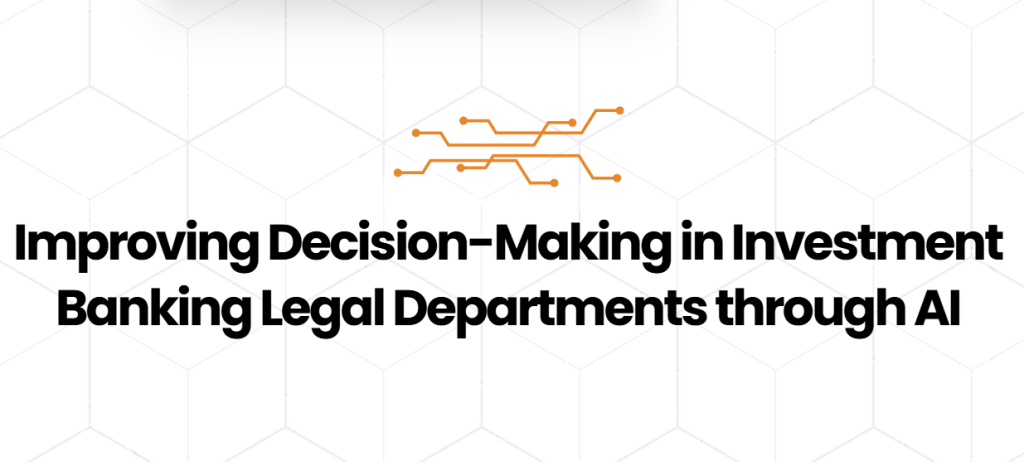
Improving Decision-Making in Investment Banking Legal Departments through AI
In the high-stakes world of investment banking, legal departments are tasked with navigating complex regulatory landscapes, ensuring compliance, and mitigating risks, all while supporting swift and strategic decision-making. The advent of artificial intelligence (AI) offers transformative potential, enabling legal teams to enhance efficiency, accuracy, and responsiveness. This article explores how AI is reshaping legal operations within investment banking, the benefits it brings, and the challenges that accompany its integration.
The Evolving Role of Legal Departments in Investment Banking
Traditionally, legal departments in investment banks have functioned as gatekeepers, ensuring that transactions and operations comply with applicable laws and regulations. Their responsibilities encompass contract review, regulatory compliance, litigation management, and advising on legal risks associated with financial products and services.
However, the increasing complexity of financial instruments, globalization of markets, and the dynamic nature of regulatory frameworks have expanded the scope and intensity of legal work. Legal teams must now process vast amounts of information, respond to regulatory changes promptly, and provide strategic counsel in real-time, all under the pressure of tight deadlines and high stakes.
AI Integration: Transforming Legal Operations
AI technologies, particularly machine learning and natural language processing, are revolutionizing legal operations in investment banking. By automating routine tasks and providing advanced analytical capabilities, AI enables legal teams to focus on higher-value activities and make more informed decisions.
1. Contract Analysis and Management
AI-powered tools can rapidly review and analyze large volumes of contracts, identifying key clauses, obligations, and potential risks. For instance, platforms like Robin AI assist firms in legal contract review and management, suggesting edits and analyzing documents to answer queries, thereby saving significant time for clients such as UBS and KPMG .
2. Regulatory Compliance and Monitoring
Compliance with regulations such as Anti-Money Laundering (AML) and Know Your Customer (KYC) is critical in investment banking. AI systems can automate the monitoring of transactions, flagging suspicious activities and ensuring adherence to regulatory requirements. For example, AI can analyze large volumes of transactions and client data to identify patterns indicative of money laundering, enhancing the effectiveness of compliance programs .
3. Legal Research and Due Diligence
AI tools can expedite legal research by quickly sifting through vast databases of legal documents, case law, and regulations to find relevant information. In due diligence processes, AI can analyze financial records, legal documents, and market data to identify potential risks and liabilities, thereby accelerating deal timelines and improving accuracy .
4. Risk Assessment and Management
AI enables proactive risk management by analyzing data to predict potential legal issues before they arise. By assessing factors such as market volatility, regulatory changes, and historical data, AI systems can forecast risks and suggest mitigation strategies, allowing legal teams to advise on preventive measures .
Benefits of AI in Legal Decision-Making
The integration of AI into legal departments offers several advantages:
- Efficiency Gains: Automating routine tasks reduces the time and resources required for legal processes, allowing teams to focus on strategic initiatives.
- Enhanced Accuracy: AI minimizes human error in document review and compliance monitoring, improving the reliability of legal work.
- Scalability: AI systems can handle increasing volumes of data and transactions without proportional increases in staffing, supporting the scalability of legal operations.
- Improved Risk Management: Predictive analytics enable early identification of potential legal issues, facilitating proactive risk mitigation.
- Cost Reduction: By streamlining processes and reducing reliance on external legal counsel for routine tasks, AI contributes to cost savings.
Challenges and Considerations
Despite its benefits, the adoption of AI in legal departments presents challenges:
1. Data Privacy and Security
AI systems require access to sensitive legal and financial data, raising concerns about data privacy and security. Ensuring robust data protection measures and compliance with data privacy regulations is paramount.
2. Algorithmic Bias and Transparency
AI algorithms may inadvertently perpetuate biases present in training data, leading to unfair or discriminatory outcomes. Ensuring algorithmic transparency and implementing measures to detect and mitigate bias are essential.
3. Integration with Existing Systems
Integrating AI tools with existing legal and IT systems can be complex and resource-intensive. Ensuring compatibility and seamless integration is necessary to realize the full benefits of AI.
4. Change Management
The introduction of AI requires changes in workflows and may face resistance from staff accustomed to traditional processes. Effective change management strategies, including training and stakeholder engagement, are crucial for successful adoption.
Case Studies: AI in Action
Several investment banks have begun integrating AI into their legal operations:
- HSBC: Implemented AI compliance systems to identify fraud risks and ensure regulatory compliance, enhancing the effectiveness of their compliance programs .
- Goldman Sachs: Utilized AI to enhance portfolio management and optimize asset allocation, demonstrating the application of AI in strategic decision-making .
- UBS: Employed AI-powered legal services for contract review and management, streamlining legal processes and improving efficiency .
The Future of AI in Legal Departments
As AI technologies continue to evolve, their role in legal departments is expected to expand:
- Predictive Legal Analytics: AI will increasingly be used to predict legal outcomes, assess litigation risks, and inform strategic decisions.
- Enhanced Collaboration Tools: AI-powered platforms will facilitate collaboration between legal teams and other departments, improving communication and efficiency.
- Continuous Learning Systems: AI systems will become more adept at learning from new data, enhancing their accuracy and adaptability over time.
- Ethical and Responsible AI Use: Emphasis will grow on developing ethical frameworks and governance structures to guide the responsible use of AI in legal contexts.
Conclusion
As AI technologies continue to evolve, their role in legal departments is expected to expand:
- Predictive Legal Analytics: AI will increasingly be used to predict legal outcomes, assess litigation risks, and inform strategic decisions.
- Enhanced Collaboration Tools: AI-powered platforms will facilitate collaboration between legal teams and other departments, improving communication and efficiency.
- Continuous Learning Systems: AI systems will become more adept at learning from new data, enhancing their accuracy and adaptability over time.
- Ethical and Responsible AI Use: Emphasis will grow on developing ethical frameworks and governance structures to guide the responsible use of AI in legal contexts.
Innovate With Custom AI Solution
- 12 Courtyard Pl,
Lexington, MA 02420 - (617)319-0174
- corp@dataprocorp.tech
